Collegiate sport requires delicate balancing act
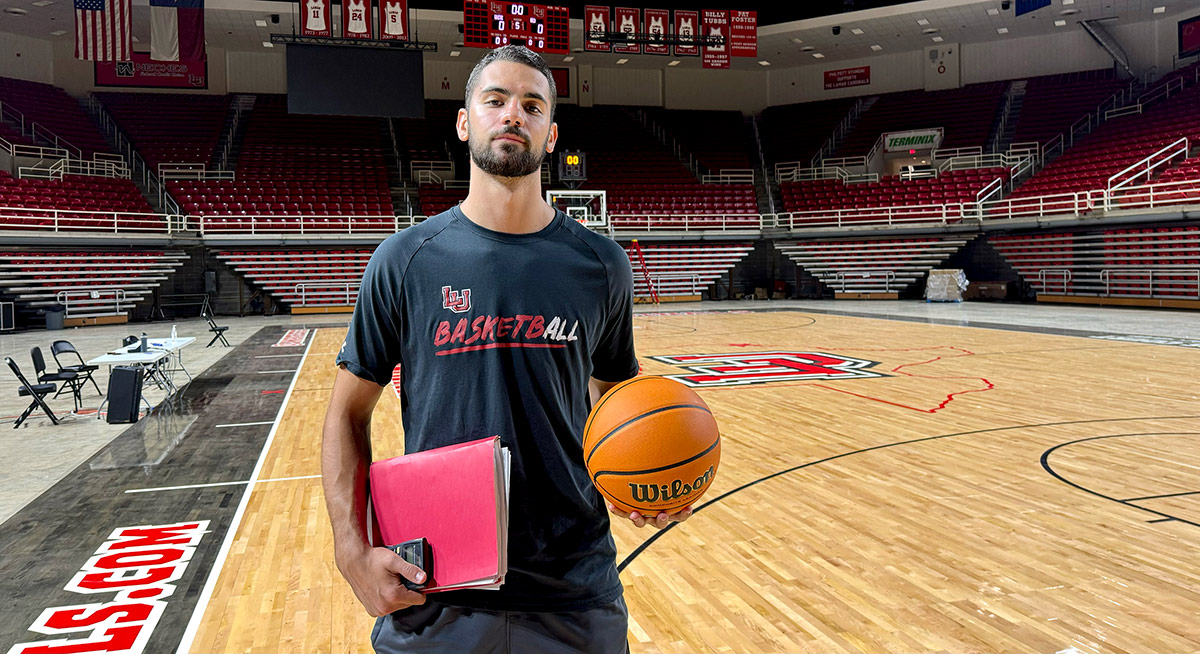
“I get up at seven every day. I have classes from eight to eleven. After that, I have shooting practice, go to eat lunch and get some rest in my room. I come back to the gym for weight training for one hour. After weights we have team practice till seven. Then I go eat dinner and do some homework — every day is like that.”
Junior Janko Bulajic describes his typical day as a member of Lamar University’s basketball team.
“There are a couple of days every week where I’m tired and don’t feel good,” he said. “But I just try to go through it and get better every day. Just trying to be professional.”
At the beginning of 2023, the forward, who was born in Montenegro in Eastern Europe, committed to Lamar University.
“My goal is to get a degree and play basketball here,” he said. “After that, I want to play professional basketball. Without discipline and without goals, you can’t do anything. It’s really hard, but I like what I’m doing.”
Bulajic is one of approximately 400 student-athletes at Lamar University. NCAA student-athletes are college students who participate in competitive sports while pursuing their academic studies — a double burden that requires an ambitious lifestyle. Balancing the intense demands of academics and athletics, student-athletes often find themselves under immense pressure. While their physical fitness is frequently in the spotlight, mental health struggles are less visible.
The Survery
A 2023 Student-Athlete Health and Wellness Study conducted by the NCAA found that 28% of student-athletes feel constantly overwhelmed by all they have to do. By comparison, a 2023 American College Health Association report found that the percentage of regular college students experiencing psychological distress is only 21%.
“The hardest part about being an athlete is the consistency that is required,” Leon Nickel, a junior from Germany on Lamar’s men’s tennis team, said. “That is what takes the most strength from me, both physically and mentally. Every day, no matter whether in class or training, you have to give it your all. Even when you’re not feeling well.”
The NCAA study found there various stress factors impact student-athletes. However, academic struggles are the most frequently cited reason among both men and women.
Balancing Act
“It’s just so much that comes with being a student-athlete,” senior basketball player T’Aaliyah Miner said. “One thing that puts a lot of stress on us is schoolwork. Our coaches require us to have a good GPA in order to play. They check our grades, classes, study hall — they really make sure we are on top of academics.”
Depending on how good a player’s GPA is, they may have to spend more or less time each week in study hall. Miner said she often has homework when she comes home in the evening.
“After the long days we have, nobody wants to go home and do schoolwork like a Google Doc or a presentation, but that’s what’s required,” she said. “I understand that in order to even get on the court, I have to take care of school.”
Road games make studying difficult. When the team is on the road for several days, Miner misses lectures and has to catch up on the material.
“Most of my teachers are willing to take extra time out to let me know what I’m missing and try to help,” she said. “But my online teachers sometimes give me a hard time.”
Life On The Road
Road trips affect athletes in all sports at LU. In the 2023-24 season, the softball team played 18 road games, men’s golf played 26 tournament days away from home, and the women’s tennis squad spent 32 days visiting other schools. During the 2023 season, the Lamar women’s soccer team played 12 road games from late August to early November.
Away trips are time-consuming and tightly scheduled, soccer senior Trinity Clark said.
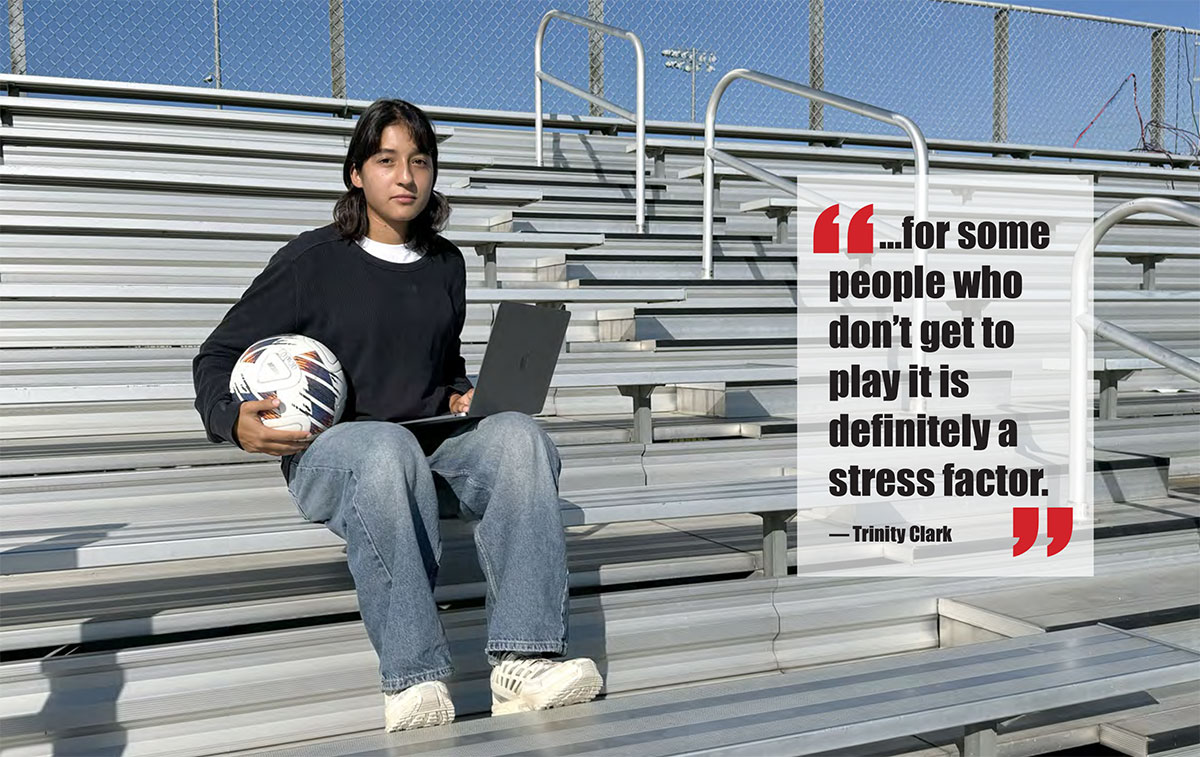
“I like them, but I don’t — It’s just too tedious, there are so many things we have to do,” she said. “If we have an away game, we’d either leave the day before or sleep at a hotel afterwards. If you have homework during those days, you’re not going to get anything done.”
Many players do their schoolwork at the beginning of the week or during the many hours of bus travel to the game.
“Not me though, because I get bus sick,” Clark said.
The days away are meticulously timed. Breakfast, game talk, snacks, stretching, lunch, warm-up, packing — Clark said she’d prefer to stick to her own routine. And the road game doesn’t end when the final whistle blows on the field.
“After the game ends, we’ll go back on the bus, maybe get dinner, and then start driving for six or eight hours,” she said. “Sometimes we get back here at one or two after midnight. And then you have to wake up the next morning because you have class.”
Fear of Getting Cut
Another factor that affects the mental strain on athletes is playing time. In the 2023 NCAA study, playing time was named a stress factor by 19% of student-athletes. For Clark, who made the All-Southland Conference Second team in 2022 and 2023, not having enough playing time is not an issue.
“I know for some people who don’t get to play it is definitely a stress factor,” Clark said. “They just watch and want to play, sometimes they cry on the bench — it’s just a lot for them. They’re also nervous their scholarship might get pulled.”
One False Step
A lack of playing time can lead to being cut from the team. This would result in the loss of athletic scholarship and possibly cause the student to drop out of college. Student-athletes’ college careers hangs by a thread — and can be over any second, as Leon Nickel, a senior on Lamar’s tennis squad, knows.
“This past summer, during the offseason, I dislocated my shoulder,” Nickel said. “I slipped during practice, landed on my shoulder, and blacked out. The injury was bad, I was two centimeters away from surgery. If I had needed surgery, I probably wouldn’t have been able to play tennis the way I did before. At that time, I felt really awful. I realized that one wrong step could put an end to all of this. Fortunately, I am on a good road to recovery and can play again now.”
Pregame Pressure
The constant pressure to perform well puts a heavy strain on athletes and leads to psychological stress — especially during tournaments, Nickel said.
“On game day, I really feel the tension — I’m totally tense and uptight,” he said. “I can hardly move and my legs are heavy. My teammates sometimes ask me, ‘What’s wrong?’ And I reply, ‘Nothing.’ But they can see it on my face.”
Rodna Willet, a counselor at Lamar University’s Student Health Center, works closely with students to provide emotional and psychological support. She said that some athletes seek her help because they experience nausea before games.
“They feel sick, some have to throw up. That’s mainly anxiety,” she said. “We talk about their anxiety. Sometimes just talking about it can help.”
In her role as a counselor, Willet assists student-athletes in managing stress, developing coping strategies, and addressing mental health challenges related to the demands of collegiate sports. She teaches athletes breathing techniques or gives them other tools to redirect their thinking before a game.
Nickel said he tries to keep himself distracted as much as possible.
“Praying also helps me,” he said. “As soon as I’m on the court and the game starts, everything is fine.”
Coaches Impact
The well-being of student-athletes is also shaped by the dynamics within the team environment. Key relationships, especially with coaches, can have a profound impact.
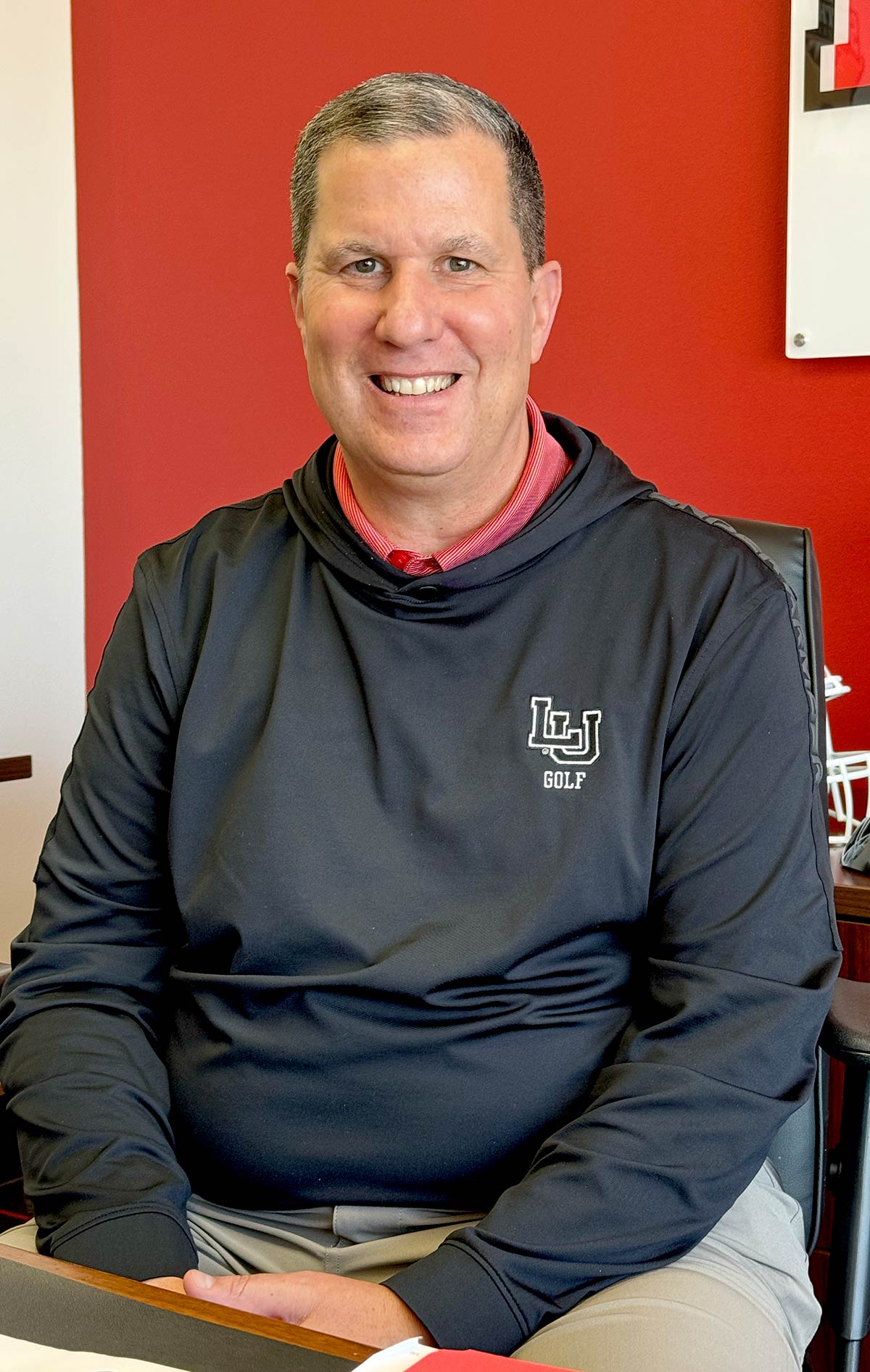
According to the NCAA study, 16% of student-athletes reported their relationship with their coach is a significant source of stress, highlighting the importance of this connection. Conversely, a positive relationship with coaches can greatly enhance an athlete’s mental well-being.
Miner said coaches have played an essential role throughout her life, providing guidance and support both on and off the field.
“They were more than coaches, they were like family to me,” she said. “They looked out for me like my parents. They sheltered us — they did everything. Seeing how much your coaches can inspire you and change your life — I look up to all of my coaches. They do great stuff for us players and people in the community.”
Miner said that her coaches at LU proactively address their players’ concerns.
“I have a really good relationship with my coaches,” she said. “If you are in a bad spot, they’ll be like mentors and try to help you. We have mental health meetings every two weeks. All 15 players get to pick a coach who they want to talk to. You can talk about everything, it doesn’t have to be basketball. We talk about family, friends, things that are going on in the world. Some players stay there talking for two hours.”
LU Athletic Director Jeff O’Malley said nowadays coaches are not just responsible for training athletes, but also taking care of their overall well-being.
“I think it is important for coaches to have relationships with their student-athletes outside of the world of sports, to understand what kind of things they are going through, how school is going or how they can help them,” he said. “Having those conversations shows the student-athletes that you as a coach care about them.”
Mental Health Resources
O’Malley said the perceptions around mental health have changed significantly, with more focus on the subject during the COVID-19 pandemic.
“There’s more conversations surrounding mental health than ever before,” he said. “Individuals like Simone Biles, who three years ago took herself out of the Olympics because of mental health issues, helped to normalize it for other individuals.
“When I was a kid, you hardly ever heard about it. Now it’s a topic of conversation almost on a daily basis.”
As the athletic director, O’Malley oversees all sports programs. In this role, he closely observes the well-being and performance of student-athletes. He said student-athletes are monitored through close interaction between coaches, trainers, counselors and administration.
“It’s a team effort,” he said. “There’s nobody in an athletic department who’s with the student-athletes more than the strength coaches and the trainers. They help us to identify individuals who are going through things, whether it’s a death in the family, tough relationship issues or other personal challenges. We also have discussions with the counseling center once a month about the number of student-athletes they’re seeing.”
In addition to counseling services, LU introduced TimelyCare, an online mental health support service, last year. Available 24/7, this resource is free for all students.
“The Texas State University System has invested a lot of resources in TimelyCare,” O’Malley said. “We made a push on our end to make sure our athletes are signed up for TimelyCare so they know it’s a resource that’s available to them. If it’s late at night and there’s nobody in the counseling center, they can go online and schedule a session.”
O’Malley said he has more plans to support the mental well-being of LU athletes.
“We try to find the resources in order to put more programming behind mental health services, both for our student-athletes and also our coaches, so that they can identify issues that they need to deal with and get the right tools,” he said.
Ordinary Problems
Willet noted that when athletes come to her for counseling, their issues are not always tied to sports.
“It’s mostly regular stresses,” she said. “The same things that everybody else is dealing with — relationship issues, anxiety, or family problems back home.”
What distinguishes athletes from their peers, Willet said, is their drive to compete which affects everything they do.
“As an athlete, you have to focus on your sport, of course,” she said. “But if you focus on your sport exclusively, then you don’t do your work in the classroom. And if you do your sport and work in the classroom, you still need to have something else besides that. Many will play video games or chat with their friends. Many have relationships. It’s about finding a balance.”
Different Experiences
Senior Jayne Sepulveda has experienced firsthand how important a healthy environment at college is. After graduating from St. Paul High School in Los Angeles, California in 2021, Sepulveda committed to Southern Utah University to play softball.
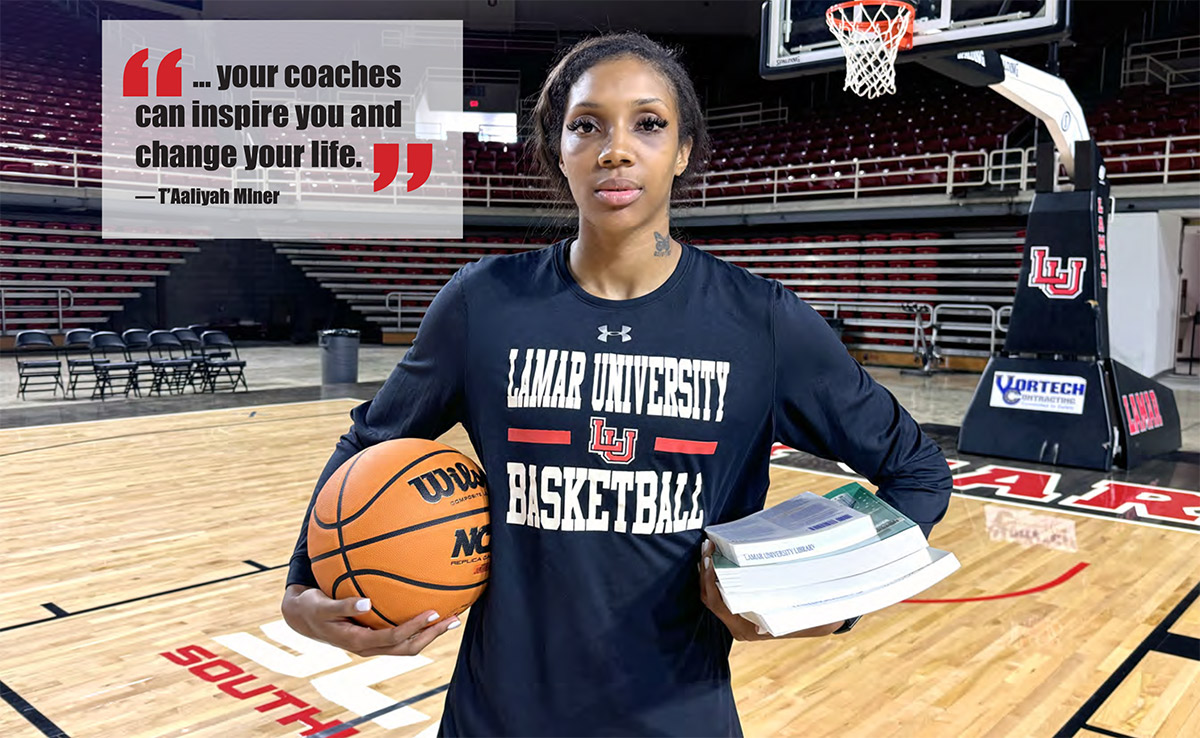
“I felt a lot of pressure coming in as a freshman,” she said. “The coaches expected a lot out of me. But they didn’t give me the tools to do so. All I had to focus on was softball. But I had personal stuff going on at home that I couldn’t think about or deal with because of softball. I felt kinda trapped and stressed out all of the time. It wasn’t a healthy environment for me to be in.”
Sepulveda’s coaches recommended she attend therapy sessions.
“It made me feel a little better, but at the same time, it also left me feeling more exhausted,” she said. “It was another thing that was added on to my plate. I know that going to therapy is a good step in the right direction, but I just didn’t feel like it was coming from a place I wanted it to come from.”
Therapy did not help her deal with the underlying personal problems and issues with her coaches. After two seasons with Southern Utah, Sepulveda entered the transfer portal and committed to Lamar entering her junior season.
A New Start
“I found a new love for softball here at Lamar,” she said. “It’s like back when I was younger, when you just wanted to play.”
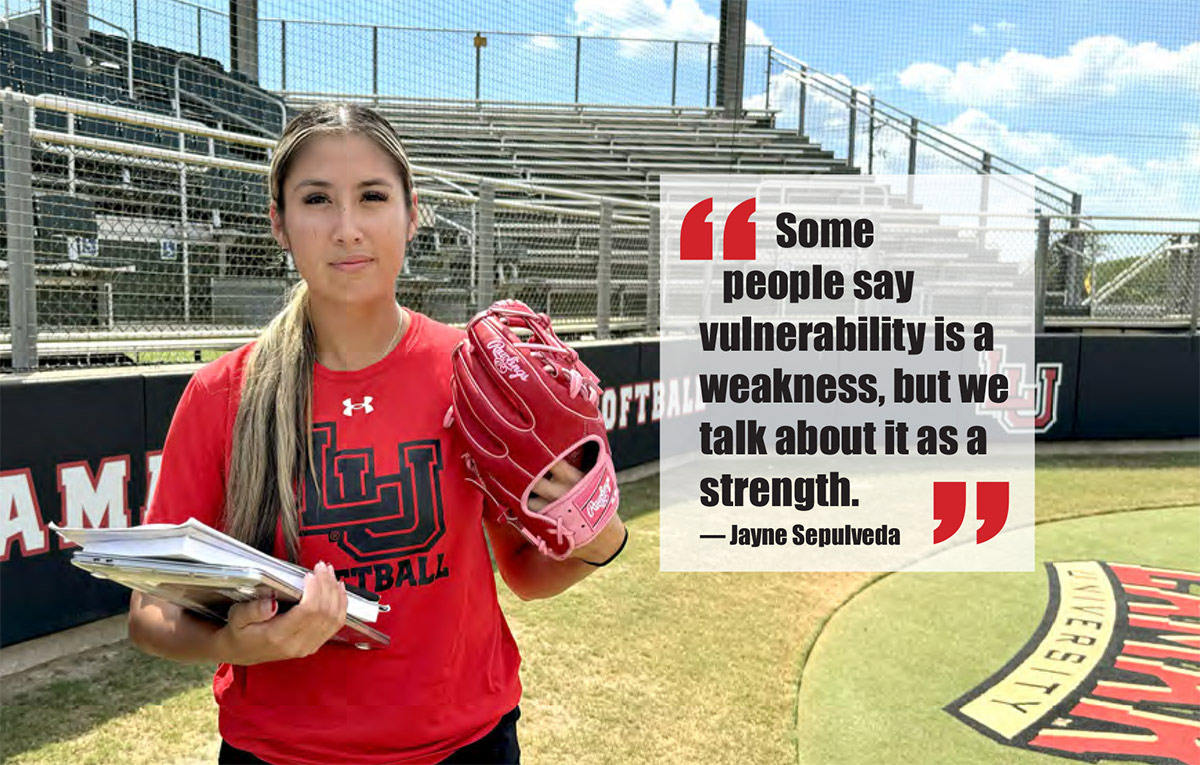
The mental well-being of the players is genuinely prioritized at Lamar, Sepulveda said.
“We talk about how important it is to take personal time for yourself and how you’re a person outside of softball,” she said. “Because softball is something that I do, not something that is me. The coaches here are very personal and don’t just focus on sports. I have a relationship with them outside softball.”
Sepulveda said strong team chemistry is crucial for maintaining a healthy environment.
“Being able to be vulnerable with each other is very important in our team,” she said. “Some people say vulnerability is a weakness, but we talk about it as a strength.”
Sepulveda said she was able to help a teammate who was going through a breakup.
“I overheard her talking about it,” she said. “And while we were picking up balls, I asked her, ‘Hey, are you okay?’ Then we ended up talking about it. That’s a universal thing among us players, we’re able to talk about things. Our coaches made it a point for us to be that way. I think that’s a really good thing for everybody.”
In addition, Sepulveda said her coaches are constantly educating themselves in the area of mental health and encourage the players to engage with the topic as well.
Creating Awareness
Last year, the Hilinski’s Hope Foundation, an NGO dedicated to promoting mental health awareness, visited campus. The organization was founded in memory of Tyler Hilinski, a college football player who died by suicide.
“They did a whole presentation that was really heavy and something that I think we all needed to see,” Sepulveda said. “Even though someone is loud in the locker room, smiling and having a good time, you don’t know what their personal life is like. You could never guess that someone’s going through something like this if you don’t ask.”
Being in a healthy environment positively impacts Sepulveda’s performance on the field, she said.
“Sometimes people get caught up in wanting to be perfect,” she said. “For example, you may want to hit the ball over the fence, or field every single ground ball that comes your way. But in softball, specifically, you’ll fail more often than you actually succeed. But having a healthy environment makes you feel okay with failing.
“For example, I’m not going to criticize someone because they missed the ball. Being comfortable with failing means that you’re comfortable with the people around you. That’s something that makes you even play better because you are not scared. When you’re not thinking about it, that’s when you do best.”
Doing What They Love
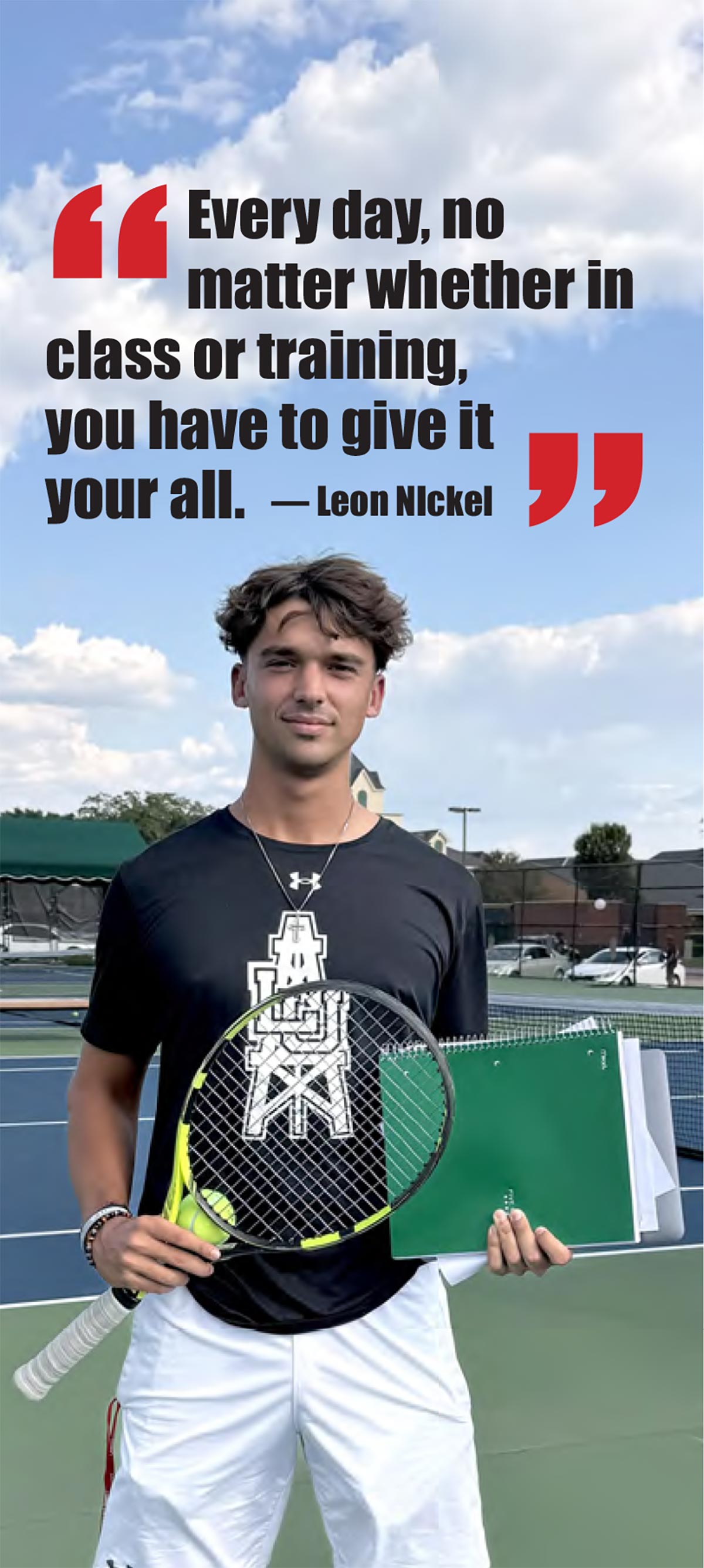
Sepulveda said there is no place she would rather be than playing softball at LU — despite all the inconveniences that come with being a student-athlete.
Nickel said he is grateful for the opportunity that being a college-athlete provides.
“Being here is everything to me,” he said. “I’m really glad I had the opportunity to come to the States to study and play tennis. I’m pushing myself hard so that after my four years in college, I can say, ‘I gave it my all and had an amazing time.’”
Clark said she does not take being a student-athlete for granted.
“Other people would do a lot to be in this position and get a scholarship and go to college,” she said. “Some days are just harder than others, and I think that’s just life. But I keep a positive attitude, because I think God will take care of everything.”
Despite tight schedules, daily hours of practice, and extensive travel, Bulajic said he enjoys his life as a college basketball player.
“If you think about it, there is no kind of negative pressure on us,” he said. “We do what we love — we play basketball.”
